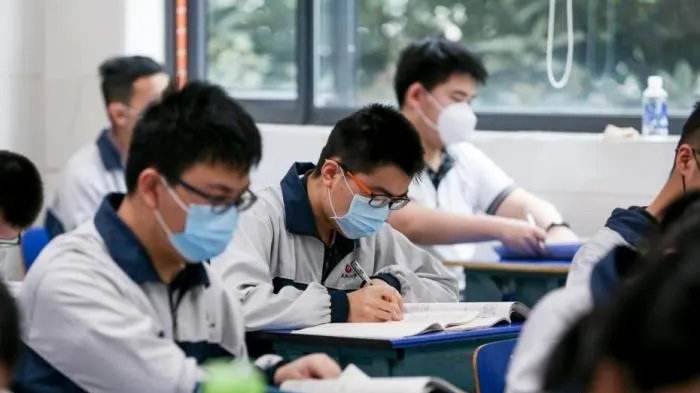New plan alters enrollment
自主招生進化為“強基計劃”,如何選拔頂尖人才?
For over 40 years, gaokao has been a touchstone for students to get admitted to certain programs in Chinese universities. But gaokao doesn't just affect individual students. As China.org put it, it can also "have a significant impact on national development".
40多年來,高考向來都是學(xué)生進入國內(nèi)高校深造的試金石。但高考影響的絕不僅是學(xué)生個人。正如中國網(wǎng)所報道的那樣,高考對于“國家發(fā)展也有著深遠的影響”。
In a move to fix talent shortages in the high-end chip, software design, intelligent technology, new materials and advanced manufacturing, and social sciences, the Ministry of Education (MOE) announced a new college enrollment plan – called the "strengthening basic disciplines plan" – that will start this year.
為解決高端芯片、軟件設(shè)計、智能科技、新材料、先進制造和社會科學(xué)等關(guān)鍵領(lǐng)域的人才緊缺問題,教育部此前宣布了一項全新的高校招生計劃——“強基計劃”,并于今年起實施。
The pilot plan has been rolled out in the country's top 36 universities. By May 13, all schools had released their distinctive enrollment plans, encouraging senior high students with special talents to sign up.
這一試點計劃將面向36所一流高校開展。截至5月13日,所有試點高校的招生簡章已陸續(xù)向社會發(fā)布,鼓勵有特殊天賦的高中生報名參加。
Before the end of May, students can apply to one of the 36 participating universities. Each applicant can choose one to four majors listed as their top preferred disciplines, reported Xinhua. Enrollment policies vary by university, with admission limits set from dozens of students to 200.
據(jù)新華社報道,五月底之前,考生可報考36所試點高校的其中一所,每位考生可以填報1-4個專業(yè)志愿。各高校都有不同的招生政策,招錄人數(shù)從幾十到兩百人不等。
These universities also detailed their recruitment procedure.
這些高校也詳細介紹了各自的招生流程。

After the results of gaokao are released, schools will release lists of qualifying students, who either excel in gaokao, or have won first or second prizes in Olympiads with gaokao scores at least higher than the first round of register lines. These applicants will then receive additional tests and interviews. The final enrollment decision is heavily based on the gaokao score, which will remain the most important criterion, accounting for more than 85 percent of the final result, says MOE.
高考成績公布后,各高校將會發(fā)布入圍學(xué)生名單:第一類是高考成績優(yōu)異的學(xué)生,第二類是奧林匹克學(xué)科競賽金牌和銀牌的獲得者,且高考分?jǐn)?shù)至少超過一本錄取線。這些考生將會參加額外的筆試與面試。教育部表示,最終錄取結(jié)果主要基于高考成績,高考成績所占比例原則上不得低于85%。
The universities have announced that they will also consider physical tests as a reference for submission, according to China Youth Daily.
據(jù)《中國青年報》報道,各高校還考慮將體育測試成績作為考生錄取的參考依據(jù)。
Once the students are enrolled, they are expecting an intensive educational program. For example, Tsinghua University has set up five schools, offering courses in chemical biology, information and computing science, theory and applied mechanics as their dominant disciplines. The university's goal is to "put admitted students in small, independent classes with the best and most specific teaching resources and learning environments for their discipline", according to Yu Xiaoxiao, the director of admission at Tsinghua University.
錄取后,學(xué)生們將參加高強度的培養(yǎng)計劃。比如,清華大學(xué)新設(shè)立了五個書院,提供化學(xué)生物學(xué)、信息與計算科學(xué)、理論與應(yīng)用力學(xué)等優(yōu)勢學(xué)科的課程。清華大學(xué)招生辦主任余瀟瀟表示,學(xué)校的目標(biāo)是將“強基計劃學(xué)生單獨編成小班,配備高水平的一流師資,提供針對具體學(xué)科一流的學(xué)習(xí)條件。”
Compared to the previous independent university enrollment scheme, under which some students could either gain admission without taking gaokao or be awarded bonus points in the exam, "the new plan positively facilitates diverse, efficient and scientific progress in Chinese college admissions", noted China.org.
此前根據(jù)高校自主招生計劃,一些學(xué)生無需經(jīng)過高考即可被錄取,或者能在高考中獲得加分,而中國網(wǎng)指出,“如今的新計劃積極推動我國高校招生取得多元、高效、科學(xué)的進步”。
"The next step is to establish an effective quality-monitoring and feedback mechanism to continuously improve enrollment and training," Zhong Binglin, member of the National Education Advisory Committee told People's Daily.
“下一步,要建立有效的質(zhì)量監(jiān)測與反饋機制,持續(xù)改進招生與培養(yǎng)工作。”國家教育咨詢委員會委員鐘秉林在接受《人民日報》采訪時如此表示。












